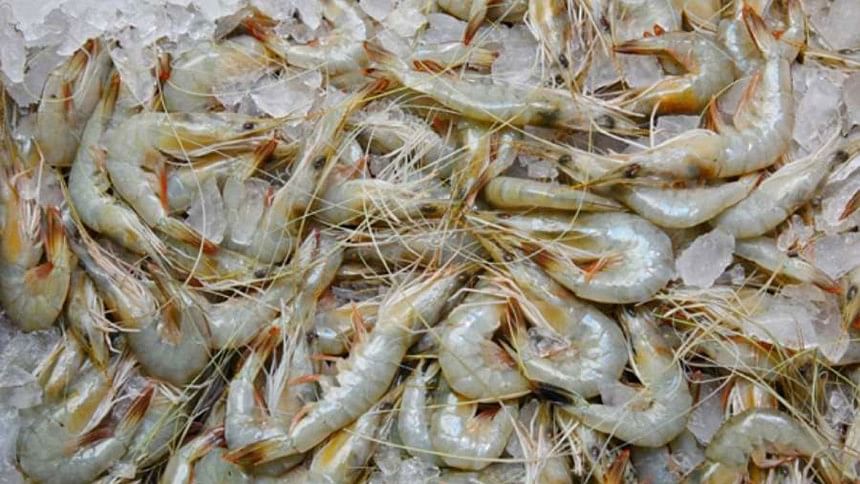Falling exports of four major sectors raise alarm

Although Bangladesh posted a higher export growth in the just-concluded fiscal year on the back of garments and some non-traditional items, four major sectors suffered a fall, raising concerns for the economy and the employment sector.
Exporters of frozen and live fish, agricultural products, leather and leather footwear, and jute and jute goods registered a slump in their earnings in 2022-23 amid waning demand resulting from the economic slowdown in major markets such as Europe.
The receipts from the shipment of frozen and live fish, including shrimp, fell 21 per cent year-on-year to $422 million, according to data from the Export Promotion Bureau (EPB).
Exporters say the main harvesting season for brackish water shrimp begins in May and they usually get good responses from buyers during this period. This year, unfavourable weather and low prices hit the export earnings from frozen and live fish.
Heatwaves in recent months affected the production of shrimps, the main export item in the basket of frozen and live fish, said Md Amin Ullah, a former president of the Bangladesh Frozen Foods Exporters Association (BFFEA).
"Besides, the consumption in our main markets is falling owing to the impact of the Russia-Ukraine war," he said, adding that prices of all types of shrimp declined.
Economies worldwide are suffering because of the war.
And since shrimp is not an essential item, its shipment has declined in Europe, the main market for black tiger shrimps, Amin said.
Shrimps accounted for three-fifths of export receipts from frozen and live fish in FY23.
The fall in export earnings of jute and jute goods was high as well in FY23.
Exporters in the segment brought home more than $1 billion for the second consecutive year until FY22. However, receipts declined 19 per cent to $912 million in the last financial year.
Md Abul Hossain, chairman of the Bangladesh Jute Mills Association (BJMA), said a number of factors such as the anti-dumping duty imposed by India on jute goods from Bangladesh and high prices of raw jute in 2020-21 affected the shipment of the products made from the natural fibre.
"Many buyers switched to alternatives of jute yarn such as cotton waste and synthetic fibre when the prices of raw jute shot up over Tk 6,000 per maund in Bangladesh."
Last week, several exporters blamed the falling shipment of jute yarn and twine for the lower demand among carpet makers in Turkey and other countries as the consumption of floor coverings has declined in the advanced economies because of high inflation and recession worries fuelled by the raging war.
The war in Sudan, one of the largest markets for Bangladesh's jute products, has affected the shipment in the northeastern African country in recent months.
Export earnings from jute yarn and twine recorded the sharpest fall among other sub-sectors in the jute industry.
Jute yarn and twine export, which accounted for more than half of earnings, dipped 29 per cent to $497 million in the July-June period of FY23.
Among agricultural products, only three items -- tea, tobacco and spices -- posted growth in export earnings. Receipts from the rest, including dry foods, suffered a decline.
Md Parvez Saiful Islam, chief operating officer of Square Food & Beverage Ltd, said the ban on the shipment of aromatic rice had negatively affected the overall export earnings from agricultural products.
"Almost 30 per cent of our export earnings used to come from the shipment of aromatic rice. We saw a dent in earnings as aromatic rice was absent in our export basket."
Mohammad Mansur, general secretary of the Bangladesh Fruits, Vegetables and Allied Products Exporters' Association, said vegetable export declined due to the higher air freight costs and the increased prices of locally grown fresh produce.
"Owing to higher production costs, we can't offer farm produce at competitive prices."
EPB data showed that leather and leather footwear export declined in FY23 and exporters earlier blamed lower orders from Europe for the slide.
Footwear is the largest contributor to the export earnings generated by the leather sector. But, in the last fiscal year, Bangladesh shipped leather footwear worth $703 million, down 6.9 per cent from a year earlier.
Leather exports declined 18.45 per cent to $123 million.
BFFEA's Amin and BJMA's Abul Hossain don't see any possibility of immediate recovery of exports in the respective sectors unless the war situation improves.
Khondaker Golam Moazzem, research director at the Centre for Policy Dialogue, said the decline of exports in the non-garment sector is alarming for the economy.
"If the trend persists, it may impact employment since manufacturers may cut jobs to tackle the challenges."
He said the export of a number of items has dropped as the US dollar crisis has brought down the imports of raw materials and raised the cost of production.
The economist suggested the commerce and labour and employment ministries monitor the situation.

 For all latest news, follow The Daily Star's Google News channel.
For all latest news, follow The Daily Star's Google News channel. 








Comments